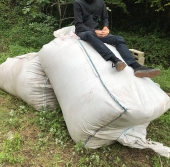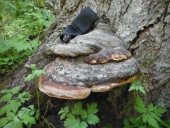




"Every house where love abides and friendship is a guest, is surely home - and home sweet home - for there the heart can rest." ~Henry Van Dyke




A build too cool to miss:Mike's GreenhouseA great example:Joseph's Garden
All the soil info you'll ever need:
Redhawk's excellent soil-building series





 1
1




Trace Oswald wrote:I'm always confused by using mushrooms to remove contaminants from soil, or in this case, bales. If you use mushrooms to remove toxins, common consensus seems to be that the mushrooms should not be eaten. To me, that means they are bringing the toxins into themselves. If that is the case, what do you do with the mushrooms? If you leave them to decay back into the soil, it seems they would release the toxins back into it. If you remove the mushrooms to somewhere else, didn't you just move the toxins at that location? Or maybe I just don't understand how it works and the mushrooms actually transform the toxins into something else.
"Every house where love abides and friendship is a guest, is surely home - and home sweet home - for there the heart can rest." ~Henry Van Dyke
 5
5




Trace Oswald wrote:I'm always confused by using mushrooms to remove contaminants from soil, or in this case, bales. If you use mushrooms to remove toxins, common consensus seems to be that the mushrooms should not be eaten. To me, that means they are bringing the toxins into themselves. ..... Or maybe I just don't understand how it works and the mushrooms actually transform the toxins into something else.
Tonya Hunte wrote: I believe because mushrooms are composters that they can really break down the chemical structure of things.
I am working, with another fellow, on a remediation study which uses fungi to break down herbicides in soil and wood, at this point in the study we have eliminated some species and found other species that work quickly to start breaking the compounds into harmless components.
Oyster is one of the best species for this and should be included in any remediation of herbicide treatment.
.... so we get a nice, hot compost heap.
When that heat is through working its magic on the heap you are ready to use it in your gardens. The nasty chemicals will be broken down and harmless to your plants.
The compost will also be chock full of good microorganisms and fungi hyphae, a huge win for your garden soil.
..... fear not, there is hope and you can remediate those chemicals so your foods are not contaminated.
You can purchase fungi either in spore or spawn forms these days and that is what will break down those nasty chemicals as well as getting your soil food web kick started for recovery.
You can also go wild foraging for mushrooms and use a blender and water to create mushroom slurries which you pour into the soil to do the same thing.
"Study books and observe nature; if they do not agree, throw away the books." ~ William A. Albrecht




James Freyr wrote:Hope this helps!
"Every house where love abides and friendship is a guest, is surely home - and home sweet home - for there the heart can rest." ~Henry Van Dyke
 2
2




"Every house where love abides and friendship is a guest, is surely home - and home sweet home - for there the heart can rest." ~Henry Van Dyke

|
This is my favorite tiny ad:
turnkey permaculture paradise for zero monies
https://permies.com/t/267198/turnkey-permaculture-paradise-monies
|



